Introduction
Spring rolls are a beloved staple in Asian cuisine, celebrated for their delightful crunch and versatility. Originating from various cultures, these delectable bites come in countless forms, ranging from fresh rice paper rolls in Vietnam to crispy fried versions in China. Today, we’re diving into a recipe for Crispy Beef Spring Rolls with Zesty Peanut Lime Sauce, a dish that beautifully marries the savory flavors of seasoned ground beef with the freshness of vegetables, all wrapped in a crispy shell. This particular take on spring rolls showcases a unique combination of flavors that truly elevates this classic appetizer into a standout dish.
What sets our beef spring rolls apart is not only the satisfying crunch but also the fusion of ingredients that cater to both taste and texture. The savory filling complements the zesty peanut lime sauce, making these rolls perfect for a variety of occasions—whether you’re serving them as an appetizer at a dinner party, a flavorful snack for game day, or even as a main course alongside a salad.
Join us as we embark on the journey of creating these mouthwatering crispy beef spring rolls. You’ll learn about the essential components that go into making a perfect spring roll, the nutritional benefits of the ingredients, and the step-by-step instructions to ensure your rolls come out crispy and delicious every time.
Understanding the Components of Beef Spring Rolls
Overview of the Traditional Spring Roll and Its Variations
Spring rolls have a long-standing history in Asian cuisine, often enjoyed during festivals and family gatherings. Traditionally, they consist of a thin pastry filled with a variety of ingredients, such as vegetables, meat, or seafood. The filling can vary widely based on regional preferences and seasonal ingredients, leading to an array of delicious variations. Some spring rolls are served fresh, while others are deep-fried to a golden crisp, making them incredibly satisfying to bite into.
In our recipe, we focus on the fried variety, utilizing a delicate wrapper that crisps up beautifully in hot oil. The addition of ground beef and fresh vegetables gives these rolls a hearty twist, making them a favorite among meat lovers. Moreover, the versatility of spring rolls allows for creativity in the kitchen—feel free to mix and match ingredients based on personal preferences or what you have on hand.
Importance of Fresh Ingredients in Achieving the Best Flavor and Texture
When it comes to crafting the perfect beef spring roll, the quality of your ingredients plays a pivotal role. Fresh vegetables not only add vibrant color but also contribute essential nutrients and crunch to the filling. Using high-quality ground beef ensures a rich, meaty flavor that forms the foundation of the dish.
Fresh garlic and ginger are indispensable for depth of flavor, while soy sauce, oyster sauce, and sesame oil add umami notes that elevate the overall taste profile. It’s essential to source seasonal vegetables for the filling; options like cabbage, carrots, and bell peppers provide not only texture but also a burst of freshness. By prioritizing fresh ingredients, you’ll achieve a spring roll that is not only delicious but also visually appealing.
Nutritional Benefits of the Ingredients Used in This Recipe
Beyond their delightful taste, the ingredients in our Crispy Beef Spring Rolls boast impressive nutritional benefits. Ground beef serves as an excellent source of protein, providing the building blocks for muscle and overall health. For those concerned about their iron intake, beef is particularly valuable, as it contains heme iron, which is readily absorbed by the body.
The vegetables in the filling add essential vitamins and minerals. Cabbage, for instance, is rich in vitamin C and K, while carrots provide beta-carotene, which is essential for healthy vision. Bell peppers are a great source of antioxidants, and green onions offer a hint of flavor while also being low in calories. The combination of these ingredients not only makes for a tasty dish but also a nutritious one, making our beef spring rolls a well-rounded choice for any meal.
Ingredients Breakdown
Detailed Description of the Beef Spring Roll Filling
Crafting the perfect beef spring roll starts with an incredible filling. The balance of flavors and textures is crucial, so let’s break down the key components that create this mouthwatering mixture.
Ground Beef: Source of Protein and Flavor
The star of our filling is the ground beef. It provides a rich, savory flavor that serves as the backbone of the spring roll. When cooked properly, it becomes tender and flavorful, absorbing the seasonings and complementing the vegetables. For this recipe, choose a ground beef with a moderate fat content, such as 80/20, to ensure a juicy and flavorful filling without being overly greasy.
Vegetables: Cabbage, Carrots, Bell Pepper, and Green Onions for Crunch and Nutrition
To enhance the filling, we incorporate a medley of fresh vegetables. Shredded cabbage offers a satisfying crunch and is an excellent base, while grated carrots add sweetness and color. Bell peppers introduce a slight sweetness and a pop of vibrant color, making your spring rolls visually appealing. Finally, sliced green onions add a mild onion flavor that elevates the filling. This combination not only enhances the flavor profile but also adds nutritional value to the dish, making every bite feel wholesome.
Seasonings: Garlic, Ginger, Soy Sauce, Oyster Sauce, and Sesame Oil for Depth of Flavor
The seasonings play an essential role in bringing the filling to life. Freshly minced garlic and ginger provide aromatic notes that are fundamental to many Asian dishes. Soy sauce adds a salty, umami flavor, while oyster sauce contributes sweetness and depth. A drizzle of sesame oil ties everything together, lending a nutty aroma that perfectly complements the beef and vegetables. This harmonious blend of seasonings ensures that the filling is bursting with flavor, making each bite of the spring roll an explosion of taste.
Exploring the Peanut Lime Sauce
While the crispy beef spring rolls are delicious on their own, the accompanying Zesty Peanut Lime Sauce takes them to the next level. This sauce is not only flavorful but also easy to prepare, making it the perfect partner for your spring rolls.
Role of Peanut Butter: Creaminess and Richness
At the heart of our peanut lime sauce is creamy peanut butter. This ingredient provides a luscious texture and a rich, nutty flavor that beautifully complements the savory beef filling. Peanut butter is also a great source of healthy fats and protein, making it a nutritious addition to the sauce.
Zesty Elements: Lime Juice and Honey for Balance
To balance the richness of the peanut butter, we incorporate fresh lime juice. The acidity from the lime juice brightens the sauce, adding a refreshing zing that cuts through the creaminess. Additionally, a touch of honey provides a subtle sweetness, creating a harmonious blend of flavors that enhances the overall experience.
Optional Heat with Sriracha: Customizing Your Sauce
For those who enjoy a little kick, adding sriracha to the peanut lime sauce is a fantastic option. The heat from the sriracha elevates the flavor profile, making the sauce even more dynamic. Adjust the amount of sriracha based on your spice tolerance—this way, you can customize the sauce to suit your personal preferences.
Step-by-Step Instructions for Making Crispy Beef Spring Rolls
Preparing the Filling
Now that we’ve explored the components that make up our beef spring rolls, it’s time to dive into the cooking process. Following these steps will ensure you create a delicious filling that brings out the best flavors.
Cooking Ground Beef to Perfection
1. Heat the Pan: Begin by heating a large skillet or wok over medium-high heat. This allows for even cooking and prevents the beef from steaming.
2. Add the Ground Beef: Once the pan is hot, add the ground beef. Use a spatula to break it apart as it cooks, ensuring it browns evenly. Aim for a golden-brown color, which will enhance the flavor.
3. Drain Excess Fat: Depending on the fat content of your ground beef, you may need to drain excess fat from the pan once the meat is fully cooked. This step is crucial to avoid greasy spring rolls.
Sautéing Aromatics for Enhanced Flavor
1. Add Garlic and Ginger: Once the beef is cooked, push it to one side of the pan. Add minced garlic and ginger to the empty space, allowing them to sauté for about 30 seconds until fragrant. This technique releases the essential oils and flavors of these aromatics.
2. Combine with Beef: After the garlic and ginger have sautéed, mix them into the ground beef. This step ensures that the entire filling is infused with those aromatic flavors.
3. Incorporate Vegetables: Add shredded cabbage, grated carrots, and diced bell peppers to the pan. Stir them into the beef mixture, cooking for an additional 3-4 minutes until the vegetables are just tender but still maintain some crunch.
4. Season the Filling: Pour in soy sauce, oyster sauce, and sesame oil, stirring well to combine. Allow the mixture to simmer for another minute, letting the flavors meld together. Taste and adjust seasoning if necessary, adding more soy sauce or a pinch of salt if desired.
Now that you have a flavorful filling ready, you’re one step closer to crafting your crispy beef spring rolls. The next steps will guide you through the assembly and frying process, ensuring that your spring rolls come out perfectly crispy and delicious.
Stay tuned for the continuation of this recipe, where we’ll explore how to assemble the spring rolls, fry them to crispy perfection, and whip up our zesty peanut lime sauce!

Combining Vegetables and Seasonings for the Filling
To create the perfect filling for your crispy beef spring rolls, it’s essential to incorporate a mix of fresh vegetables and seasonings that complement the beef. Start by finely chopping a combination of vegetables such as carrots, bell peppers, and green onions. These not only add color and crunch but also enhance the nutritional profile of your dish.
To season the filling, add minced garlic and ginger, which bring a fragrant aroma and depth of flavor. A splash of soy sauce or tamari will introduce a savory umami note, while a sprinkle of black pepper will add just a hint of heat. Mix these ingredients in a bowl until they are evenly distributed, ensuring a robust and well-rounded filling.
For an extra layer of flavor, consider incorporating a teaspoon of sesame oil and a dash of chili flakes if you prefer a spicier kick. This combination of fresh vegetables and balanced seasonings will create a filling that is not only delicious but also vibrant and appealing.
Assembling the Spring Rolls
Once your filling is prepared, it’s time to assemble the spring rolls. Begin by laying out your spring roll wrappers on a clean, dry surface. If you’re using rice paper wrappers, they will need to be soaked in warm water for a few seconds until they become pliable. For wheat-based wrappers, they can be used directly.
To assemble, take one wrapper and place it in front of you in a diamond shape, with one corner pointing toward you. Spoon about 2 tablespoons of the beef and vegetable filling onto the center of the wrapper. Be cautious not to overfill, as this can lead to leaks during frying.
Techniques for Rolling Spring Rolls to Prevent Leaks
Rolling spring rolls may seem daunting at first, but with a few simple techniques, you can achieve perfect rolls every time. Start by folding the bottom corner of the wrapper over the filling, tucking it in snugly. Next, fold the sides in toward the center, creating a sealed pocket. Finally, roll the spring roll away from you, maintaining the tension to keep the filling secure.
To prevent leaks, ensure that your filling is not too wet. If you find your filling is moist, consider draining excess moisture or adding a binding agent such as cornstarch or breadcrumbs to help hold everything together. Also, make sure to roll tightly without tearing the wrapper, as a loose roll can easily come apart during cooking.
Tips for Sealing the Wrappers Effectively
To ensure your spring rolls are sealed properly, you can use a simple method involving water. Dampen your fingertip in water and run it along the edges of the wrapper before sealing. This helps to activate the starch in the wrapper, creating a sticky surface that adheres better.
If you’re using rice paper, you can also use a thin paste made from flour and water to seal the edges. This method provides extra security and prevents any potential leaks during frying. Once rolled, place the spring rolls seam-side down on a plate.
Frying the Spring Rolls
Frying the spring rolls is where the magic happens, transforming them into crispy, golden delights. Start by choosing the right oil for frying; vegetable oil or peanut oil are excellent choices as they have high smoke points and neutral flavors.
Heat the oil in a deep skillet or wok to around 350°F (175°C). To test if the oil is ready, drop in a small piece of bread; if it sizzles and turns golden brown in about 30 seconds, the oil is hot enough for frying. Carefully add the spring rolls to the hot oil in batches, taking care not to overcrowd the pan, which can lower the oil temperature and lead to soggy rolls.
Importance of Draining Excess Oil for Crispiness
Once the spring rolls are golden brown and crispy, typically after 3-4 minutes of frying, remove them from the oil using a slotted spoon and place them on a paper towel-lined plate. This step is crucial for achieving that perfect crunch. The paper towels will absorb excess oil, preventing the rolls from becoming greasy. Allow them to rest for a few minutes before serving to let the oil drain fully.
Preparing the Peanut Lime Sauce
While your spring rolls are frying, you can prepare the zesty peanut lime sauce, which is the perfect accompaniment. In a mixing bowl, combine creamy peanut butter, fresh lime juice, soy sauce, honey, and a splash of water.
Mixing Techniques for a Smooth Sauce
To achieve a smooth and creamy consistency, start by whisking the peanut butter and lime juice together. Gradually add the soy sauce and honey, mixing until well combined. If the sauce seems too thick, slowly incorporate water until you reach your desired consistency.
For an added zing, consider stirring in minced garlic or a few chili flakes for some heat. Once mixed, taste and adjust the seasoning, adding more lime juice or honey as desired to balance the flavors.
Adjusting Consistency for Dipping
The ideal peanut lime sauce should be thick enough to cling to the spring rolls but not so thick that it can’t be easily dipped. If you find it too thick, simply add a little more water or lime juice until you achieve the perfect dipping consistency.
Serving Suggestions
When it comes to serving your crispy beef spring rolls, presentation is key. Arrange the spring rolls on a large platter, and consider garnishing with fresh herbs like cilantro or mint for a pop of color. You can also place lime wedges on the side for an extra burst of freshness.
For pairing options, consider serving these spring rolls with a refreshing beverage such as iced tea or a light beer. Side dishes like a simple green salad or Asian noodle salad complement the rolls beautifully, adding variety to your meal.
Creative Ways to Serve the Peanut Lime Sauce
Instead of serving the peanut lime sauce in a bowl, try using small dipping cups for individual servings or drizzle the sauce over the spring rolls for a beautiful presentation. You can also serve the sauce alongside some freshly cut vegetables like cucumber sticks for a refreshing crunch.
Nutritional Information
Understanding the nutritional content of your crispy beef spring rolls can help you appreciate the balance of flavors and nutrients in this dish. Each serving typically contains around 250-300 calories, depending on the size and filling.
Discussing the Balance of Macronutrients and Vitamins in the Dish
These spring rolls provide a good balance of macronutrients, with protein from the beef, healthy fats from the peanut sauce, and plenty of vitamins and fiber from the fresh vegetables.
Potential Modifications for Dietary Preferences
For those with dietary preferences or restrictions, consider using gluten-free wrappers made from rice paper or spring roll wrappers. You can also substitute the beef with tofu or tempeh for a vegetarian option, ensuring that everyone can enjoy this delicious dish.
Conclusion
Crispy beef spring rolls paired with zesty peanut lime sauce offer a delightful blend of flavors and textures that make them a favorite for both casual meals and special gatherings. The combination of savory beef, fresh vegetables, and a tangy sauce creates a memorable dining experience that is sure to impress.
Cooking and sharing homemade recipes like these spring rolls not only brings joy to your kitchen but also creates lasting memories with loved ones. So gather your ingredients, roll up your sleeves, and indulge in the art of making crispy beef spring rolls. Whether you’re serving them at a party, enjoying them as a snack, or making them for a family dinner, this dish is bound to become a cherished favorite.
Beef Spring Rolls with Peanut Lime Sauce
Ingredients


